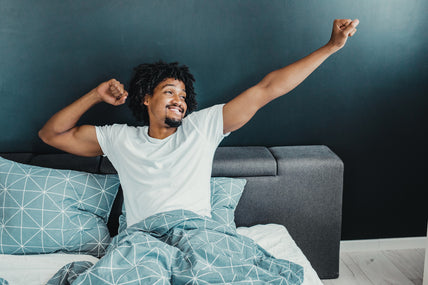How Much Sleep Do I Need?

How do you know if you’re getting enough sleep?
Most of us have probably heard that the human body needs between 6-8 hours of sleep on average for optimal health. However, some people claim that they’re able to function on as little as 4-5 hours, while others say they need more than 9 hours of sleep to get through each day.
Lack of sleep can really take a toll on your mood, energy, mental alertness, ability to handle stress and even your health. So it’s important to understand your personal nightly sleep needs and plan a healthy sleep schedule that works for you.
How many hours of sleep do we actually need?
 Not many people realize that there is a huge difference between the amount of sleep you need to get by and the amount you need to function optimally.
Not many people realize that there is a huge difference between the amount of sleep you need to get by and the amount you need to function optimally.
According to this chart by the National Sleep Foundation, it’s recommended that the average adult gets at least 7-9 hours of sleep each night.
However, the amount of sleep an individual may actually need differs according to each person. There’s a number of different factors that determines how much sleep a person requires, such as whether they have any accumulated sleep debt, and the quality of the sleep they’re getting.
How do you know if you’re getting enough sleep?
The signs of sleep deprivation can be subtle, especially if you’ve been sleep deprived for some time. You may not even be aware just how much your lack of sleep has already been affecting your life.
For example, you may feel that it’s normal to feel sleepy in a warm room, or to find yourself nodding off during a long, boring meeting. What you don’t realize is that it’s only “normal” if you’re sleep-deprived. If you’re getting enough sleep, you should have no trouble staying awake and alert throughout the day.

Lack of sleep can really take a toll on your mood, energy, mental alertness, ability to handle stress and even your health. So it’s important to understand your personal nightly sleep needs and plan a healthy sleep schedule that works for you.
Here’s a short test you can take to determine if you’re getting enough sleep. Just ask yourself the following questions:
- Do I need an alarm clock in order to wake up on time?
- Do I have a hard time getting out of bed every morning?
- Do I get drowsy while driving, or after eating a heavy meal?
- Do I feel sluggish in the afternoon?
- Do I have trouble remembering things or concentrating on tasks?
- Do I need a nap to get me through the day?
- Do I fall asleep within 5 minutes of going to bed?
If the answer to most of those questions was “yes”, then you’re not getting enough sleep.
How do I get the sleep that I need?
The quality of your sleep is just as important as the quantity. Healthy, restful sleep has five stages that cycle through the night in distinct patterns, with each stage typically lasting about 90 minutes on average. If you wake up in the middle of a sleep cycle, then you’re likely to feel groggy and moody when getting up the next morning.

LUNA Natural Sleep aid is designed to help you fall asleep, stay asleep and wake up in the morning feeling refreshed, not groggy.
To improve the quality of your sleep so you’ll wake up feeling fresh and energized, here are some things you can try.
1. Adjust your bedtime.
Start going to bed earlier by adjusting your usual bedtime in 15-minute reductions each week. For example, if you usually sleep at 11pm, try going to bed at 10:45pm instead for about a week and see if you still feel tired. If you do, then go to bed at 10:30pm the next week.
Ideally, you’ll want to determine what time you should be going to bed in order to get the optimal amount of sleep that you need, so you can wake up when you need to and still have energy for the entire day.
Alternatively, you can also search for a sleep calculator app to reduce the hassle. These apps help calculate your optimal bedtime for you, and some can even track your sleep quality during each sleep cycle.
2. Try a natural sleep aid.
We created a natural and non-habit forming sleep aid that the people closest to us could count on. The LUNA formula starts with Melatonin to help reset your body’s natural sleep cycle and a blend of calming herbs, including extracts of Chamomile, Lemon Balm, Passionflower, Hops and Valerian, to help relax both body and mind at bedtime. LUNA helps you fall asleep, stay asleep and wake up in the morning feeling refreshed, not groggy.

Start going to bed earlier by adjusting your usual bedtime in 15-minute reductions each week. For example, if you usually sleep at 11pm, try going to bed at 10:45pm instead for about a week and see if you still feel tired. If you do, then go to bed at 10:30pm the next week.
3. Stick to a regular sleep schedule.
Once you find a bedtime that works for you, stick to it! Help reset your biological clock and circadian rhythms to this new sleeping schedule by going to bed and waking up at the same time each day (yes, including weekends!).
4. Manage your anxiety and stress.
Anxiety and stress can both be factors that contribute to poor quality of sleep. Work towards managing your stress and anxiety in productive ways, and leave your problems outside of the bedroom so that you’ll be able to get a good’s night rest.
Now go catch some z’s!
Some people may not need as much sleep as others, while others may need more in order to get through their day.
What’s important is for you to determine how much sleep you need in order to be wide-awake, alert, in a great mood and functioning at your best each day.
Get LUNA Natural Sleep Aid Here
Sources:
http://www.mayoclinic.org/healthy-lifestyle/adult-health/expert-answers/how-many-hours-of-sleep-are-enough/faq-20057898
https://www.helpguide.org/articles/sleep/how-much-sleep-do-you-need.htm
https://www.nhlbi.nih.gov/files/docs/public/sleep/healthy_sleep.pdf
https://sleepacademy.org/2012/02/02/how-to-tell-if-you-are-getting-enough-sleep/
SaveSave



